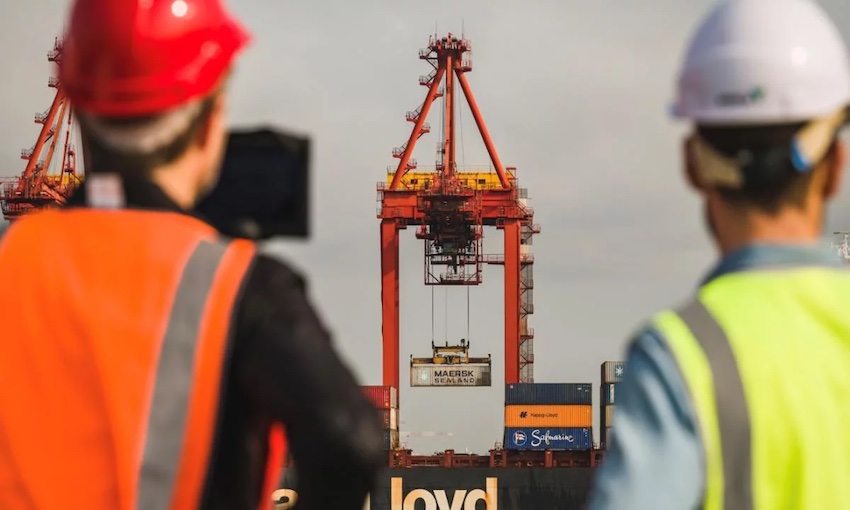THE Productivity Commission has today (9 September) released its draft report into Australia’s maritime logistics system, and it is calling for reform to overcome perceived underperformance.
The draft report, Lifting productivity at Australia’s container ports: between water, wharf and warehouse, has been a work in progress since December last year, when the Productivity Commission launched an inquiry into the structural issues affecting productivity in the nation’s maritime system, and in particular, container ports.
As part of the inquiry process, productivity commissioners analysed long-term trends in system performance and explored industrial relations, infrastructure constraints and technology uptake.
They also invited industry to supply submissions and comments into the inquiry, receiving 79 submissions earlier in the year.
A key point raised in the draft report is that that inefficiencies at Australia’s container ports cost the Australian economy an estimated $605 million each year.
Commissioner Stephen King, one of two productivity commissioners who carried out the inquiry, said Australia’s major container ports underperform their “best practice” peers overseas.
“Underperformance on Australia’s ports directly costs business and consumers,” Commissioner King said.
“Any sustained disruptions to imports or exports magnify these costs across the economy because of the critical role of ports to trade and commerce.”
But the Productivity Commission suggested that increased productivity is achievable, adding that considerable variation in performance across container terminal operators is pointing to potential productivity gains from more consistent performance.
However, it also noted that Australia’s container ports have slower ship turnaround times, attributable to the use of fewer cranes to handle containers.
“[T]erminal operators’ performance in handling containers is highly variable,” Commissioner King said.
“Simply achieving world average ship turnaround times would deliver significant benefits.”
Another factor perceived to have lowered productivity at container ports held enough significance to be considered a key point of the report: that workplace arrangements are lowering productivity, and incremental changes to the Fair Work Act are needed.
Commissioner Julie Abramson, who conducted the inquiry alongside Commissioner King, said workplace arrangements at container terminals are holding back productivity.
“Highly restrictive clauses in terminal operators’ enterprise agreements limit the ways that workers and equipment can be deployed,” she said.
The draft report said from the outset that disruptions during recent enterprise bargaining imposed large costs on businesses dependent on maritime freight.
It said more effective remedies are needed to limit “unreasonably protracted” bargaining and industrial action.
The commission said limits should be placed on clauses in container terminals operators’ enterprise agreements that are “highly restrictive” and constrain the ways workers and equipment can be deployed.
“Changes to the Fair Work Act and operation of the Fair Work Commission are recommended to tackle protracted enterprise bargaining in container ports and the disruptive industrial action that comes with it,” Commissioner Abramson said.
The report also raised the issue of lack of competition, which in some parts of the maritime logistics system means consumers are paying too much.
Transport operators, it said, have no choice about which terminal they use when picking up or dropping off a container, so must pay whatever price is set by the terminal operator.
Recent rapid increases in terminal access charges have reportedly flowed through to cargo owners as well as consumers.
The Productivity Commission said in its draft report that terminal operators should only be able to levy fixed charges such as terminal access charges on shipping lines, which can choose which terminal to use.
And, transport operators and cargo owners are reportedly paying fees to shipping lines for the late return of containers even where the delay is because empty container parks are full.
Commissioner King identified the use of market power as a problem.
“Truck drivers have to pay whatever price the terminal operator demands to pick up or drop off a container,” he said. “The shipping lines choose the terminals so they should pay these charges.”
That view was shared by Commissioner Abramson, who talked about transport and cargo owners having to pay fees to shipping lines when they return containers late, because the empty container parks they are directed to are full.
“This doesn’t seem like fair conduct,” she said. “Australian consumer law exempts these contracts and this should be remedied.”
On a more encouraging note, the draft report found infrastructure needs in the maritime logistics system are being addressed.
For example, container port operators and other parts of the maritime logistics system are investing to accommodate bigger ships, without the need for government intervention.
Plans are also in place to increase the share of freight moving to and from most major container ports by rail over the coming decades.
On top of that, all state governments have freight and transport strategies that cover future port infrastructure needs, and evidence does not suggest more plans are required or that existing plans will not be implemented.
Another key point explored in the draft report is that the adoption of technology at Australia’s container ports is broadly in line with international practice.
Though the coverage of the report extends well beyond the key points outlined, one more point was considered vital enough to communicate from the outset: that “concerns about domestic shipping capacity and training may be better resolved by means other than a strategic fleet”.
The Productivity Commission argued capacity could be acquired as needed from the international market without the costs involved in supporting a national strategic fleet.
And, it said Australian-flagged vessels are “not a prerequisite” to meeting maritime skill requirements.
According to the report, cadetships and skilled migration “appear to be working well” in meeting needs for blue-water experience.
The Productivity Commission said it is seeking further information and feedback following the release of the draft report, due 14 October.
The final inquiry report is scheduled to be handed to the Australian government by the end of December this year.

